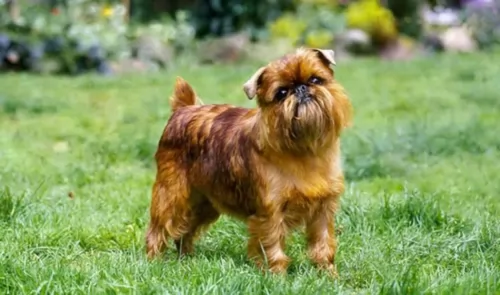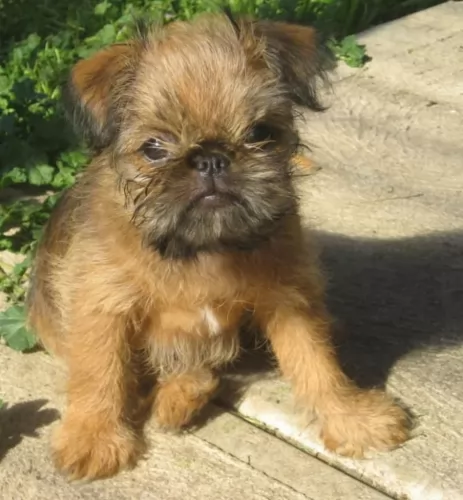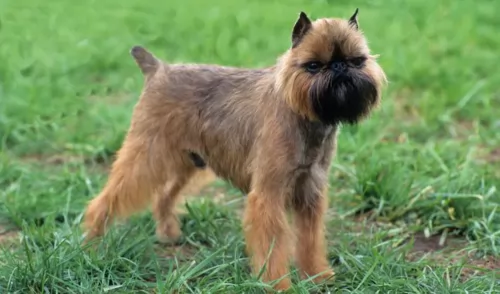 Petzlover
Petzlover Belgian Griffon is originated from Belgium but Spanish Pointer is originated from Spain. Belgian Griffon may grow 47 cm / 18 inches shorter than Spanish Pointer. Belgian Griffon may weigh 24 kg / 52 pounds lesser than Spanish Pointer. Both Belgian Griffon and Spanish Pointer has same life span. Belgian Griffon may have less litter size than Spanish Pointer. Belgian Griffon requires Moderate Maintenance. But Spanish Pointer requires Low Maintenance
Belgian Griffon is originated from Belgium but Spanish Pointer is originated from Spain. Belgian Griffon may grow 47 cm / 18 inches shorter than Spanish Pointer. Belgian Griffon may weigh 24 kg / 52 pounds lesser than Spanish Pointer. Both Belgian Griffon and Spanish Pointer has same life span. Belgian Griffon may have less litter size than Spanish Pointer. Belgian Griffon requires Moderate Maintenance. But Spanish Pointer requires Low Maintenance
 The Belgian Griffon isn’t your most attractive dog, but maybe its his quirky, gremlin looks that makes him such an adored pet for many. There are different varieties of Griffon, and the Belgian- and Brussels Griffon are one and the same. All small Belgian dogs have the same breed standards, with the Belgian having a rough coat The dog hails from Belguim and its ancestors were no doubt a mix of the Belgian street dog, the Stable Griffon and the Affenpinscher.
The Belgian Griffon isn’t your most attractive dog, but maybe its his quirky, gremlin looks that makes him such an adored pet for many. There are different varieties of Griffon, and the Belgian- and Brussels Griffon are one and the same. All small Belgian dogs have the same breed standards, with the Belgian having a rough coat The dog hails from Belguim and its ancestors were no doubt a mix of the Belgian street dog, the Stable Griffon and the Affenpinscher.
Later on in the 1800s, this combination was then crossed with the Pug, giving the dog the brachycephalic or flat faced look.
Unfortunately no written records were kept about the precise origin of this breed, but there is also the idea that the King Charles- and English Toy Spaniel were also involved in its development. These small dogs were bred to catch rats in the barns of European estates.
 The Spanish Pointer is a large hunting breed. The dog hails from Spain and it is believed that the dog was used to develop other pointing breeds.
The Spanish Pointer is a large hunting breed. The dog hails from Spain and it is believed that the dog was used to develop other pointing breeds.
It is popular in Spain but fairly unknown beyond Spanish borders. Known as the Burgos Pointer, the official name for the dog is Perdiguero de Burgos.
It is thought that the dog comes from mixing the Pachon Navarra and the Sabueso Espanol. The dog was developed to point out game so they have the typical longish head with the pointing tail.
 There are different variations of this dog to give it its distinctive look and size. This quaint looking little Griffon canine comes with two different coat types - soft or wiry. With the Belgian Griffon, his wiry coat of red, tan or black will need to be brushed at least twice a week. Shedding with this dog is seasonal.
There are different variations of this dog to give it its distinctive look and size. This quaint looking little Griffon canine comes with two different coat types - soft or wiry. With the Belgian Griffon, his wiry coat of red, tan or black will need to be brushed at least twice a week. Shedding with this dog is seasonal.
He has a compact, sturdy little body, and he trots around with attitude. With his sharp pointed ears and whiskers, he has been given the nickname ‘bearded dog’. His dark black eyes are alert. He is self-confident, intelligent and curious breed, a great family pet and good with children if he has grown up with them in the home. He is good with other pets. The fact that this is a small breed and that he doesn’t have excessive energy levels, means he is adaptable to city- and country living.
 The body of this dog is true to the Pointer type of dog with the body being muscular and lean.
The body of this dog is true to the Pointer type of dog with the body being muscular and lean.
He stands at between 62 to 67cm in height and weighs about 25 to 30kg. The ears are quite long and floppy and the tail is usually docked to a third of its length.
The coat which is mostly short can be whitish with tan or brown markings with freckling or it can be a brownish shade with darker brown markings.
The Spanish Pointer is a quiet, calm, gentle dog and not at all aggressive. They’re able to get on well with children and other pets.
They’re dogs that love the great outdoors and aren’t suited to city living. They’re dogs that need a good deal of exercise too. Being intelligent the pointer dog will benefit from training and socialization.
 The Belgian Griffon is an affectionate pet and often establishes a strong bond with one member of the family. You’ll have your Griffon with you for about 15 years so make sure he is trained and a pleasure to have around.They are difficult to train, being somewhat stubborn so they are going to require patience. They’re sensitive too, and they won’t respond well to aggressive treatment.
The Belgian Griffon is an affectionate pet and often establishes a strong bond with one member of the family. You’ll have your Griffon with you for about 15 years so make sure he is trained and a pleasure to have around.They are difficult to train, being somewhat stubborn so they are going to require patience. They’re sensitive too, and they won’t respond well to aggressive treatment.
They’re much more indoor dogs than outdoor dogs because they’re also vulnerable to heat stroke. They just want to come indoors and be with their human family, and when you do that for them, they’ll become a wonderful friend and companion to you.
 Your attractive Spanish Pointer is such an amicable dog that it is a pleasure to have him around you.
Your attractive Spanish Pointer is such an amicable dog that it is a pleasure to have him around you.
He makes such a splendid pet, but only if their intense exercise needs are catered to. He can’t possibly be expected to spend days in a tiny yard with nothing to do. It would be cruel.
Their top priority is to be out in the fields hunting. Nonetheless he gets on well with children and other dogs, and with the right home and environment you’ll be so glad you chose one of these beautiful dogs as your friend.
 When you get your Griffon from a reputable breeder, you always have a better chance that he’ll be healthy. As it is, the Belgian Griffon has few hereditary health issues. However his dark eyes will have some genetic problems to contend with and he could suffer with progressive retinal atrophy. This is an illness which can lead to blindness
When you get your Griffon from a reputable breeder, you always have a better chance that he’ll be healthy. As it is, the Belgian Griffon has few hereditary health issues. However his dark eyes will have some genetic problems to contend with and he could suffer with progressive retinal atrophy. This is an illness which can lead to blindness
Syringomyelia – this is a neurological condition – an abnormality of the spinal cord – a disease which occurs more frequently in small breeds. It can cause your pet to endure a lot of pain.
Birthing Issues - these little dogs often have problems with giving birth, and a vet often has to intervene and perform a cesarean.
 The Spanish Pointer is a healthy dog breed that can live to be as old as 15 if he gets the right care.
The Spanish Pointer is a healthy dog breed that can live to be as old as 15 if he gets the right care.
Like other dogs, they can develop certain health problems, and you want to be aware of cherry eye, ear infections, hip dysplasia and allergies.
These dogs just love to swim, and it can be difficult to keep the inside of his ears from moisture.
Unfortunately wax, dirt and moisture can all cause an ear infection. Ear infections can be extremely painful. You’ll see your dog shaking his head and pawing at his ears. There will be redness inside the ear and possibly a discharge too. He will need to see the vet.
 The Belgian Griffon will do well if you invest in high quality foods. You can make your own, but if you’re concerned about his health, it would be best to check what ingredients should go into his home-prepared meals to ensure he gets all the vitamins and minerals he needs.
The Belgian Griffon will do well if you invest in high quality foods. You can make your own, but if you’re concerned about his health, it would be best to check what ingredients should go into his home-prepared meals to ensure he gets all the vitamins and minerals he needs.
If you want to go with commercially manufactured dog foods, check with your vet about wet- and dry foods. Your vet will help with choosing a food appropriate to his size and age. Always ensure that there is clean, fresh water available to your pet.
Even though he is a small breed, he is fairly active and he will need his fair share of exercise like ball games and walks. Training and socialization are a must for him. You’ll notice that training isn’t particularly easy with this breed, and first time dog owners might not have the patience with him.
 As a hunting dog, the Spanish Pointer has always been used to a lot of exercise. If you don’t use him for hunting, you will need to take him on long walks. They just love sniffing around and following a scent. Ball and frisbee games where you get him running will be excellent for him.
As a hunting dog, the Spanish Pointer has always been used to a lot of exercise. If you don’t use him for hunting, you will need to take him on long walks. They just love sniffing around and following a scent. Ball and frisbee games where you get him running will be excellent for him.
The Spanish Pointer is a large hunting dog, so when you choose commercially manufactured dog food, make sure it’s for large breed dogs. Also make sure the food is for active dogs too.
The manufacturers of these dog foods know what vitamins and minerals to include for active dogs like these. Read the packaging carefully and avoid the inferior dog foods as they are full of ingredients that can make your dog sick.
Try and feed your Spanish Pointer some home-made food too. Make sure it isn’t spicy, exotic foods as these can cause digestive problems.
Food such as boiled chicken, brown rice or pasta, sweet potatoes, spinach and carrots are superb, simple food choices for your canine friend. You can chop it up and add some of this to the dry kibble twice a week as a treat for your pet.
Try and add some raw meat to the diet occasionally as this can be helpful in preventing skin infections.
The coat of your dog is short so a good brush twice a week will keep it in tip top condition. If he is super active, with a mitt or damp cloth you can wipe down his fur if it has mud stuck to it. It’s your time to check him over for ticks and fleas as well.